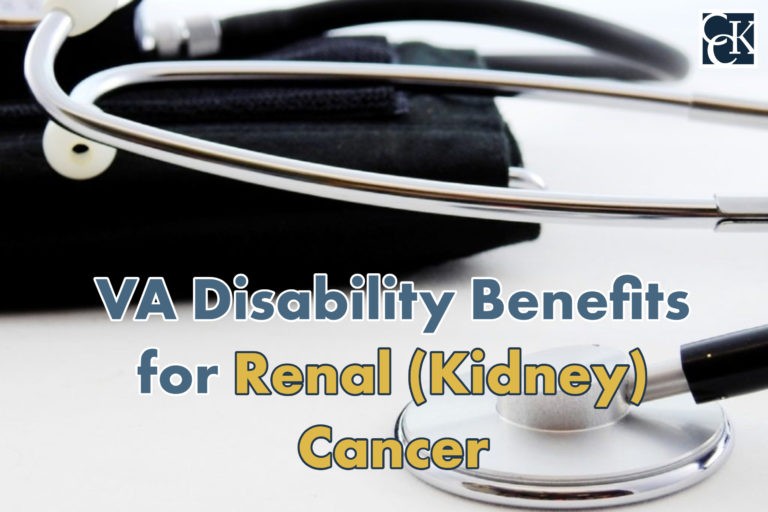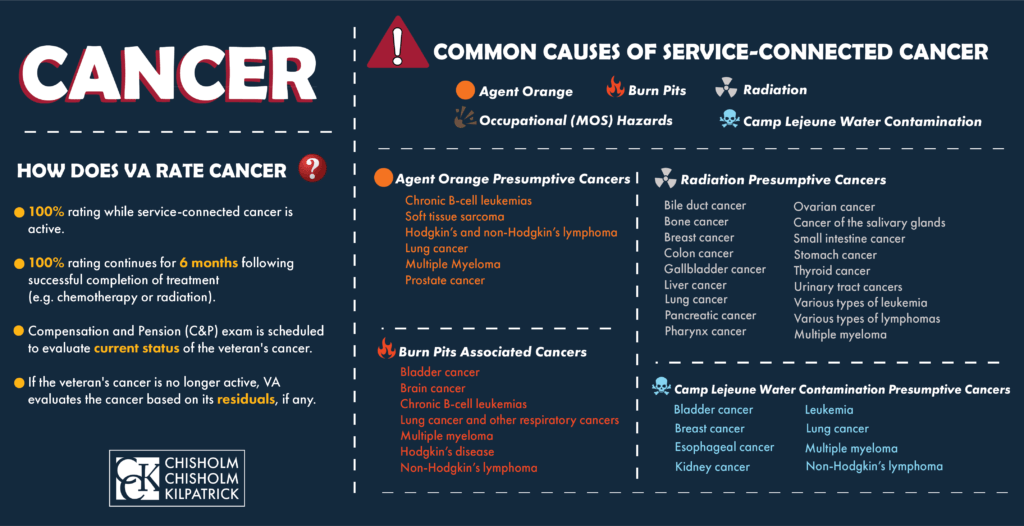VA Disability Benefits for Renal (Kidney) Cancer

What is Kidney Cancer?
Kidney cancer, also called renal cancer, is a disease in which kidney cells become malignant (i.e., cancerous) and grow out of control, forming a tumor. This disease rarely causes signs or symptoms to emerge in its early stages and there are currently no routine tests to screen for it in the absence of symptoms. However, symptoms that occur in the later stages include:
- Blood in urine
- Pain in back or side that does not go away
- Loss of appetite
- Tiredness
- Fever (intermittent)
In order to diagnose kidney cancer, doctors perform tests and procedures including blood and urine tests, imaging tests, and tissue biopsies. After a diagnosis is established, doctors will then assign a number, called a stage, to describe the extent and severity of the condition. The stages range from I-IV, with IV being the worst. Treatment options may include surgery, targeted therapy, radiation therapy, and clinical trials.
How Does VA Rate Kidney Cancer?
VA can rate kidney cancer in several ways based on the status of the disease and any accompanying or residual conditions that may be present. If a tumor is benign, it is evaluated under DC 7529, benign neoplasms of the genitourinary system, and rated based on how it affects the surrounding genitourinary system. If the tumor is malignant, or active, it is evaluated under Diagnostic Code (DC) 7528, malignant neoplasms of the genitourinary system, and given a 100 percent disability rating. This 100 percent disability rating will continue for the first six months after the last treatment, at which point it is re-evaluated. If the cancer is no longer active, it is then rated based on any residual symptoms, such as renal dysfunction.

Ratings of the genitourinary system based on dysfunctions are found under 38 CFR § 4.115a. Renal dysfunction, which is most commonly associated with kidney cancer, is rated as follows:
- “100% – requiring regular dialysis, or precluding more than sedentary activity from one of the following: persistent edema and albuminuria; or, BUN more than 80mg%; or, creatinine more than 8mg%; or, markedly decreased function of kidney or other organ systems; especially cardiovascular
- 80% – persistent edema and albuminuria with BUN 40 to 80mg%; or, creatinine 4 to 8mg%; or, generalized poor health characterized by lethargy, weakness, anorexia, weight loss, or limitation of exertion
- 60% – constant albuminuria with some edema; or, definite decrease in kidney function; or, hypertension at least 40% disabling under DC 7101
- 30% – albumin constant or recurring with hyaline and granular casts or red blood cells; or, transient or slight edema or hypertension at least 10% disabling under DC 7101
- 0% – albumin and casts with acute nephritis; or, hypertension non-compensable under DC 7101
Toxic Exposure and Kidney Cancer
While the relationship between toxic exposure and kidney cancer has been studied, it has been challenging for veterans to become service connected for kidney cancer relating to their exposure.
However, the recently passed Honoring Our PACT Act has added kidney cancer to the list of presumptive conditions for veterans suffering from certain toxic exposure, such as burn pits or particulate matter. This means that if a veteran’s service meets the criteria for “covered veterans” and they have developed kidney cancer as the result of exposure, they should be eligible for presumptive service connection.
A covered veteran is defined as one of the following:
- A veteran who, on or after August 2, 1990, performed active military, naval, air, or space service while assigned to a duty station in, including air space above:
- Bahrain
- Iraq
- Kuwait
- Oman
- Qatar
- Saudi Arabia
- Somalia
- United Arab Emirates
- A veteran who, on or after September 11, 2001, performed active military, naval, air, or space service, while assigned to a duty station, including the airspace above:
- Afghanistan
- Djibouti
- Egypt
- Jordan
- Lebanon
- Syria
For these eligible veterans, the presumptive list will include:
- Asthma diagnosed after service
- Head cancer (of any type)
- Neck cancer (of any type)
- Respiratory cancer (of any type)
- Gastrointestinal cancer (of any type)
- Reproductive cancer (of any type)
- Lymphoma cancer (of any type)
- Lymphomatic cancer (of any type)
- Kidney cancer
- Brain cancer
- Melanoma
- Pancreatic cancer
- Chronic bronchitis
- COPD
- Constrictive bronchiolitis or obliterative bronchiolitis
- Emphysema
- Granulomatous disease
- Interstitial lung disease
- Pleuritis
- Pulmonary fibrosis
- Sarcoidosis
- Chronic sinusitis
- Chronic rhinitis
- Glioblastoma
When President Biden officially signed the PACT Act into law, he and VA Secretary McDonough announced that the rollout period for certain presumptive conditions for covered veterans would be waived. Initially, these presumptions were effective upon the date of enactment of the PACT Act only for certain conditions, while presumptions for other conditions would become effective on a rolling basis over the next few years. Now, with this new rollout plan, the presumption for all conditions are effective from the date the PACT Act was signed (August 10, 2022) and VA will begin adjudicating these claims as soon as January 2023. Veterans should know, however, that newly eligibly claimants will not get retroactive benefits back to the date of their original claim unless they are filing a claim for DIC benefits.

Camp Lejeune Water Contamination and Kidney Cancer
From 1953 to 1987, everyone living or working at Camp Lejeune was exposed to a variety of toxins in the water and later, many became sick with a host of health problems.
The Honoring Our PACT Act has created a federal cause of action for an individual, including veterans, who resided, worked at, or otherwise was exposed to Camp Lejeune’s water, including in utero exposure, for at least 30 days between August 1, 1953 and December 31, 1987. This means that those exposed under the above criteria can sue the federal government for benefits related to exposure.
These claims for benefits are under the exclusive jurisdiction of the Eastern District of North Carolina. Any awards that are granted are subject to offsets for federal benefits the claimant condition receives for the claimed condition. Essentially, this means that if a veteran is service connected for a condition linked to their exposure at Camp Lejeune, then the amount of compensation awarded will be offset.
The statute of limitations for the federal cause of action is two years from the date of passage of the Honoring Our PACT Act or 180 days after the claim is denied under 28 USC § 2675, whichever is later.
Additionally, veterans with at least 30 days of service (consecutive or nonconsecutive) at Camp Lejeune, North Carolina within the above mentioned period may be eligible for service connection on a presumptive basis for certain conditions associated with the water contamination, including kidney cancer. In order to receive presumptive service connection for kidney cancer, Camp Lejeune veterans must show that they served during the specified time period and have a current diagnosis.
Other VA Benefits for Kidney Cancer
VA provides a variety of other benefits related to kidney cancer and disease regardless of veterans’ service-connected or non-service-connected status.
Dialysis Care
VA offers healthcare services to veterans with chronic kidney disease regardless of whether they are service connected for the condition. Specifically, dialysis care is a covered benefit under VA’s Medical Benefits Package for veterans enrolled in VA healthcare. A list of all Veterans Health Administration dialysis facilities can be found on VA’s website.
Home Dialysis
Home-care dialysis performed by patient or designated caregiver at his or her home is an alternative to in-center dialysis if the veteran chooses VA as his or her provider. If veterans are medically acceptable candidates, VA will provide them with the necessary training, medical equipment and supplies, and home support required to perform home dialysis. In this case, there are two types of home dialysis: hemodialysis and peritoneal dialysis. VA must make both types available to veterans, or offer it through non-VA healthcare if the veteran’s VA facility is unable to provide that service.
Transplant
Kidney transplants are also available for veterans who are eligible. A list of locations that provide kidney transplant services can be found on VA’s website as well.
Call Chisholm Chisholm & Kilpatrick LTD for a Free Case Evaluation
If you are currently suffering from kidney cancer and are interested in pursuing VA disability benefits, Chisholm Chisholm & Kilpatrick LTD may be able to help. Our firm is highly experienced in handling a variety of claims and appeals. Call our office for a free case evaluation today at 800-544-9144.
About the Author
Share this Post
